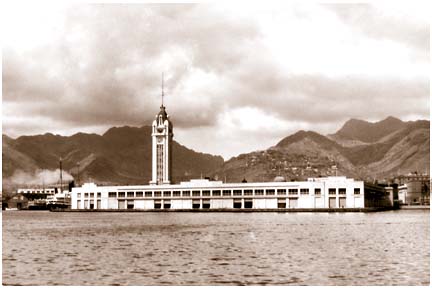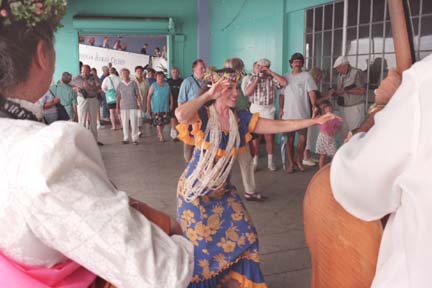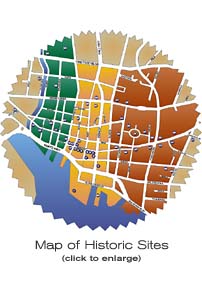
[ MAUKA MAKAI ]
BURL BURLINGAME / BBURLINGAME@STARBULLETIN.COM
Aloha Tower, an imposing feature of Honolulu's skyline since 1926, is Hawaii's best-known symbol of visitor hospitality -- and a good starting point for a tour.
The city has put together
a list of 50 landmark sites
that can be seen on
a three-hour walking tour
If there is a single icon that symbolizes Honolulu's architectural skyline, the Aloha Tower qualifies. For decades the 10-story structure dominated the harbor landscape as the tallest building in the Territory of Hawaii.
And it almost wasn't built. Aloha Tower was the center of a fierce controversy in 1925 as the Territorial Legislature tried to balance pro-tower advocates with those who wanted no tower at all. There was even a seven-story compromise tower suggested.
The approved design was of a mix of Art Deco elements applied to a traditional Gothic tower. The highest points are marked by seagoing elements such as a series of widow's walks and a yardarm-style flag mast used to signal ships.
When Aloha Tower opened in 1926, the imposing building offered spectacular views of the harbor and housed an observatory and lookout station for harbor pilots. The structure also served as a navigation landmark that could been seen from 15 miles at sea.
The tower was camouflaged just after the attack on Pearl Harbor, when it was considered to be a prime target for sabotage. Patrols by Army sentries didn't end until the camouflage was sandblasted off in 1947.
During the Golden Age of Matson luxury cruises from the 1930s to early '40s, Aloha Tower was the point of contact for mainland visitors arriving and departing the islands. When travel shifted to aviation transportation beginning in the late '50s, the Aloha Tower complex became largely hidden in a bewildering series of ramps and concrete barriers.
In the early '90s, the pier area, generally avoided by Honolulu residents, was stripped down and converted into a pleasant mall of shops, restaurants and musical venues, dubbed Aloha Tower Marketplace.
Now, as when it opened, Aloha Tower is a widely recognized symbol of the hospitable Hawaiian Islands.
Aloha Tower
Date of Completion:
1926Architect:
Arthur ReynoldsAddress:
Pier 9Primary tenant:
Department of Transportation,
Harbors Division
BACK TO TOP |
COURTESY OF HAWAII STATE ARCHIVES
Soldiers of both sexes embarked at a camouflaged Aloha Tower during World War II, at top.
CRAIG T. KOJIMA / CKOJIMA@STARBULLETIN.COM
Don Ho's at the marketplace serves as a place of respite for today's military, who are contending with a new war.
COURTESY OF HAWAII STATE ARCHIVES
When it was built, the gleaming, 10-story Aloha Tower was used as a navigation aid for ships entering the harbor.
STAR-BULLETIN / 1999
Today's cruiseliner guests aren't much different from those of decades past. They are still greeted by hula dancers and Hawaiian music.
BACK TO TOP |
See Honolulu city highlights
Various Honolulu historical organizations have clamored for years to have some sort of survey created of downtown Honolulu's historical sites. The mayor's Office of Economic Development stepped in last year to create order, and 50 locations were chosen as representative of Honolulu's history.
There is, of course, far more history in Honolulu's streets than indicated here, but these sites give the high points and can be visited on a walking tour lasting about three hours.
To commemorate Honolulu's bicentennial, the Star-Bulletin kicks off "Holoholo Honolulu" today, a year-long project to examine these historic properties. For the next 50 Sundays in the Travel section, stories and photographs will illuminate these sites.
But that's just the tip of the architectural iceberg. Viewers can step right into these locations via the magic of QuickTime Virtual Reality, a computer process that allows visitors from around the world to feel as if they're standing right there on the street.
BACK TO TOP |
Quicktime VR Panoramas
Click on pictures to view panaromas
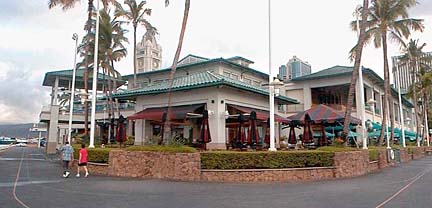
BURL BURLINGAME / BBURLINGAME@STARBULLETIN.COM
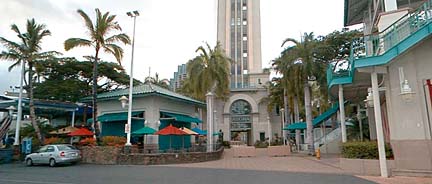
BURL BURLINGAME / BBURLINGAME@STARBULLETIN.COM
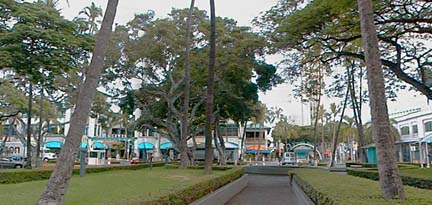
BURL BURLINGAME / BBURLINGAME@STARBULLETIN.COM
WE'RE ALSO looking for old photographs of these sites to scan for public use. If you have anything, let us know:
Write to:
Holoholo
Honolulu Star-Bulletin
7-210 Waterfront Plaza
500 Ala Moana
Honolulu, HI 96813.E-mail:
bburlingame@starbulletin.com
Click for online
calendars and events.





